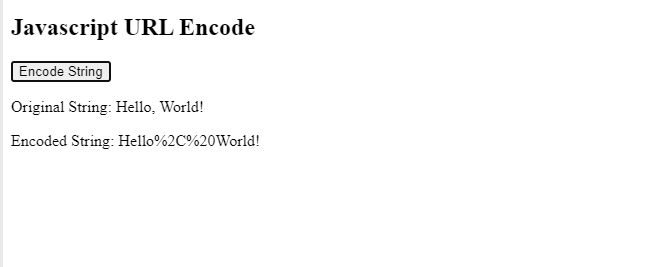How to Encode and Decode URLs in React and JavaScript
Learn how to encode and decode URLs in JavaScript and React Js using built-in functions such as encodeURI, encodeURIComponent, decodeURI, and decodeURIComponent. These functions are useful for passing data in query strings, handling special characters, and creating valid URLs.

Thanks for your feedback!
Your contributions will help us to improve service.
How can I encode a URL using React.js?
Encoding a URL inReact Js involves converting special characters to their corresponding URL-encoded representations using the encodeURIComponent() function.
React Url Encode Example
xxxxxxxxxx <script type="text/babel"> const { useState, useEffect } = React function App() { const url = 'https://fontawesomeicons.com/search?q=React.js'; const encodedUrl = encodeURIComponent(url); return ( <div className='container'> <h3>React Js Encode Url</h3> <p className='original-url'>Original URL: {url}</p> <p className='encoded-url'>Encoded URL: {encodedUrl}</p> </div> ); }; ReactDOM.render(<App />, document.getElementById("app")); </script>Output of React URL Encode String

How can I decode a URL in React.js? Could you provide an example?
Decoding a URL reverses this process, converting URL-encoded characters back to their original form using the decodeURIComponent() function
React Js Decode Url Example
xxxxxxxxxx <script type="text/babel"> const { useState, useEffect } = React function App() { const url = 'https%3A%2F%2Ffontawesomeicons.com%2Fsearch%3Fq%3DReact.js'; const decodedUrl = decodeURIComponent(url); return ( <div className='container'> <h3>React Js Decode Url</h3> <p>url: {url}</p> <p>Decoded URL: {decodedUrl}</p> </div> ); }; ReactDOM.render(<App />, document.getElementById("app")); </script>Output of React Js Decode Url

How to Encode URL in Javascript?
If you want to encode a URL or a URL component in JavaScript, you have two built-in functions to choose from: encodeURI() and encodeURIComponent(). These functions replace certain characters with their UTF-8 escape sequences, making the URL safe and valid. However, they have different use cases and encode different sets of characters. You will also see some examples on how to encode spaces, query parameters, and special characters
Javascript URL Encode Example
xxxxxxxxxx <script> function encodeString() { const originalString = "Hello, World!"; const encodedString = encodeURIComponent(originalString); // Display the strings on the webpage document.getElementById("encodedString").textContent = "Encoded String: " + encodedString; }</script>
JavaScript URL Decode: How to Use decodeURIComponent()
If you want to decode a URL component in JavaScript, you can use the built-in function decodeURIComponent(). This function converts percent-encoded characters back into their original form, such as spaces, special symbols, and non-English letters. In this article, you will learn how to use decodeURIComponent() with examples, how it differs from decodeURI(), and what errors to avoid when decoding a URL component.
Javascript Url Decode Example
xxxxxxxxxx <script> function decodeUrl() { // URL-encoded string const encodedString = "Hello%20World%21"; // Decode the URL-encoded string const decodedString = decodeURIComponent(encodedString); // Display the result on the webpage document.getElementById("result").textContent = "Decoded String: " + decodedString; }</script>